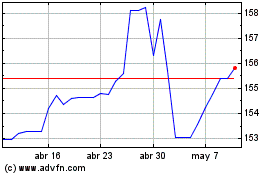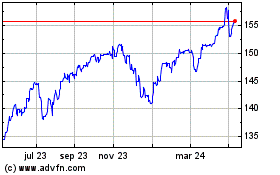Bank Of England Boosts QE; Holds Record Low Rate
18 Junio 2020 - 4:51AM
RTTF2
The Bank of England announced additional quantitative easing and
left its interest rate unchanged at a record low to combat the
sharp recession triggered by the coronavirus pandemic.
The Monetary Policy Committee, headed by BoE Governor Andrew
Bailey, decided to raise the size of the asset purchase programme
by GBP 100 billion to GBP 745 billion.
Eight members including Bailey voted to raise the QE as they
judged that a further easing of monetary policy is warranted to
meet its statutory objectives, while Chief Economist Andrew Haldane
preferred to maintain the programme at GBP 645 billion.
The MPC expects the programme to reach GBP 745 billion, around
the turn of the year.
The nine-member committee unanimously decided to hold the
interest rate at 0.10 percent, as widely expected. The bank had
altogether reduced the rate by 65 basis points at two unscheduled
meetings in March.
The need to continue supporting the economy will undoubtedly
fuel further discussion about whether negative rates are on the
horizon, ING economist James Smith said.
"We certainly wouldn't rule out negative rates further down the
line, particularly if the economic recovery does prove to be more
turbulent," the economist added.
Policymakers said they are ready to take further action as
required to support the economy and ensure a sustained return of
inflation to the 2 percent target. Inflation has fallen to 0.8
percent in April, triggering the explanatory letter from the BoE
Governor to the Chancellor alongside this monetary policy
announcement. Inflation then fell further to a four-year low of 0.5
percent in May.
The below-target inflation was largely driven by the effects of
the pandemic. Lower oil prices and the sharp drop in domestic
activity added downward pressure on inflation through increased
spare capacity.
Recent data suggested that the fall in the second quarter GDP
will be less severe than previously estimated, but cautioned about
a risk of higher and more persistent unemployment.
The economy and the labor market will take some time to recover
towards its previous path, the bank said. Inflation is projected to
fall further in coming quarter, reflecting weak demand.
The MPC noted that there are greater risks around the potential
for longer lasting damage to the economy from the pandemic.
The economy had contracted at a record pace of 20.4 percent in
April from March, as the pandemic hit all areas of the economy.
The Organisation for Economic Cooperation and Development, last
week, projected the UK economy to shrink sharply by 14 percent in
2020, if there is a second virus outbreak later in the year. An
equally likely single-hit scenario would still see GDP fall sharply
by 11.5 percent, the think tank said.
US Dollar vs Yen (FX:USDJPY)
Gráfica de Divisa
De Mar 2024 a Abr 2024

US Dollar vs Yen (FX:USDJPY)
Gráfica de Divisa
De Abr 2023 a Abr 2024
